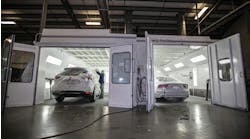Content brought to you by ABRN. To subscribe, click here.
What you will learn:
- How working with a dealership can drive additional business
- Why it's important to be comfortable working with dealer service advisors
- How to manage the relationship
Nearly a decade ago, ABRN published the article “Dealer’s Choice,” which examined how the time was ripe for new car dealers to take a far greater role in the collision repair market. A number of factors pointed to this transition, even with many dealerships having closed their own body shops years before:
- There was increased competition with the growing number of new vehicle lines and dealerships, leaving many dealers with smaller profit margins on new car sales and a need to grow their other profit streams, especially service and parts. Dealers had certain advantages here. There were some parts, especially some structural parts, that only they could sell.
- They also had easier and better access to OEM repair instructions.
- They had immediate access to the customers they sold cars to who would turn immediately to them for warrantied repairs.
- OEM digital help services like OnStar could help direct customers who had been in an accident to dealer-run shops.
- Turnkey solutions were available that could help dealers quickly set up collision repair shops and help manage them.
While the market didn’t see an uptick in dealer shops, dealers over the last decade have flexed their mighty muscles in the market. They sponsor shops interested in joining certification programs. They handle an increasing number of restricted parts, and they perform calibration services denied to independent operations. They are firmly cemented as powerful central players in collision repairs.
What does this mean to you? It could mean a lot more dollars in your pockets. If you see dealers as “sometimes partners” you go to for certain parts and services (where you’re on their tight schedules), you’re missing the point. By building your relationships with nearby dealers, you can add business in a number of ways with an immediate payoff.
Use the following five tips to make these tighter bonds possible.
Tip 1. Recognize how dealers can transform an independent shop
In 1990, Nedal Khatib and Bob Ellison founded Chantilly Auto Body in Chantilly, Va. The business quickly grew to become a high-performing MSO based on Its reputation for quality repairs and customer satisfaction, and the aggressive efforts it took to bring in customers. A central part of those efforts was working with dealers. Since its founding, Chantilly approached nearby dealers who didn't operate collision repair shops and made arrangements to help service their customers.
Chantilly added its own staff members to work full-time in the service lanes of multiple dealers, with additional staff working part-time with other dealers in auto parks, along with another who made regular visits to several nearby dealers. These employees work with dealer staff, recommending work for customers and then scheduling it.
"The dealers love it," says Ellison’s nephew Rob Ellison. "It provides a service they couldn't otherwise offer to their customers."
This formula provided the business with an eye-popping additional 150-200 cars each month, or roughly 15-20 percent of its business. The relationship it had with dealers also helped Chantilly's efforts to gain OEM certifications, which typically require a dealer sponsor. Chantilly's is certified to work on Volkswagen, Nissan, Infiniti, Chrysler, and GM vehicles. It’s also certified to perform aluminum work on the Ford F-150.
Of special note, Volkswagen requested the business receive its certification because Chantilly's was already servicing its fleet at VW's nearby headquarters.
Consider now that there are nearly 18,000 new car dealerships -- few with their own body shops -- in the USA, and just over 30,000 independent collision repairers. That’s plenty of potential business.
There is plenty you can do for dealers, including the bodywork on vehicles they’re trying to sell, detailing, being a reliable partner they can send customers to, and more. In return, they can sponsor you to be a certified shop, send a steady stream of customers your way, provide you with OEM parts, assist with tough repair problems or steps, and place you ahead of other shops trying to schedule sensor calibration and other OEM services.
What’s important here, says Lee Urban, a former shop manager who also used to work in the service department for several auto dealers, you can work out details of a relationship you have with a dealer and make those details different from the ways you work with other dealerships.
“You have the opportunity to set up customized business relationships that benefit both parties, and that play off each’s unique place in the market,” he says. “It’s a little bit of extra effort that I’ve always seen pay off.”
Tip 2: Get accustomed to working with dealer service advisors
When you decide to sit down with the “top brass” of a dealership (ownership), you’ll want to hammer out the details of your business relationship. For example, in exchange for you agreeing to purchase OEM parts through them, they recommend customers go to you for bodywork or they agree to send you new cars that were damaged while on their lots.
Regardless of the setup, you’ll probably need to deal directly with their frontline workers, the service advisors who will help sell your services. In Chantilly’s case, the business put its own employees to work in the dealership. Don’t worry if you can’t do that, since you can train their advisors to work with you.
Ron Reichen, president of Precision Auto Body in Beaverton, Ore., says his business “deputizes” advisors as salespeople for the shop. He has agreements in place that involve dealer service advisors walking around a vehicle that is being brought in for mechanical work to look for body damage. These same advisors use a template Precision created to help guide them. If there is damage, the dealership contacts Precision, who then sends out an estimator to calculate the damage and contacts the customer with a work estimate.
Reichen says the arrangement benefits all the parties involved.
“Because the vehicle is checked out before it’s brought in for repairs, the dealer is protected from any claims by the customer that it was damaged there,” Reichen says.
In return, his shop picks up extra work.
Precision also provides these service advisors with classes to build their sales skills, which benefits the dealer in the form of more work and assists when insurance adjusters are involved with damaged mechanical parts and when questions arise over some warranty issues. Should Precision have a customer whose vehicle is totaled, for example, a Toyota, they can contact the Toyota dealer who will give the customer “preferred treatment” in buying another Toyota, making the buying experience much easier for them.
“It’s a win-win relationship,” says Reichen. “Each side gets something, and the customer is taken care of.”
Tip 3: Formalize the relationship
When you sit down with the principals of the dealership, you need to make that kind of pitch, Urban says. Reichen notes that you shouldn’t just contact a dealer; state that you are certified in the vehicles that dealer sells and then ask the dealer to send you work. He and Urban note that you need to view dealers as a “customer on steroids,” in one sense the same type of customer you work to please every day but with many more cars. The business must run both ways to benefit both sides.
If this kind of work is new for your shop, Reichen says there’s nothing wrong with cold-calling a dealer and setting up a meeting to discuss how you can work with them. Urban recommends planning well ahead, so you have a better grasp on what your shop can do for a dealer and what the dealer, in turn, can offer.
“This is not a one-visit arrangement,” Urban says. “Put together a presentation, talk about what you can offer one another, and then plan the next meeting. Give them time to think it over and get to know one another. Rush into this kind of business relationship, and you’re almost guaranteed to fail."
From there, Urban says to get the full arrangement in writing and sign a formal contract. “Include items like exclusivity, making sure that under normal circumstances they’ll send all work to you and recommend your shop, while the markup on OEM parts that you buy is set, and the rate you charge for your services is recorded as well.”
Tip 4: Regularly manage and grow the relationship
Once you get the early part of the relationship established, keep in mind that you’ll need to manage it every day. Reichen’s business touches base with his dealers every day. On Wednesdays, Precision delivers dozens of bagels to the advisors it works with.
Reichen says the regular contact is necessary, in part, because of the turnover rate for service advisors who often move from one dealer to another or to an independent mechanical repairer. This means his business must help train the replacement advisors, which takes time but is a necessary investment.
Reichen also says he looks for ways to grow the relationship. For example, he also provides consulting services for dealers, helping provide another eye on their operations and making suggestions to help their throughput. His shop also helps examine trade-ins to determine if their previous repairs were done correctly so the dealer doesn’t end up selling an unsafe vehicle.
Further, Precision offers complimentary towing on dealer vehicles that break down during a test drive.
“You’re always working to build the relationship,” he says. “You never get beyond the dating stage.”
Tip 5: Keep a close eye on your bottom line
Considering the potential business that can go back and forth between shops and dealers, you might expect these relationships to provide easy money. Think again. Remember that you might be giving up something to get something.
For example, you could be offering discounted services or agreeing to buy OEM parts from a particular source. Those costs can add up, as can the time you invest in these operations. Urban says you’ll continually need to monitor what you’re giving up versus what you’re getting in return. And there’s a tremendous chance that being sponsored by a dealer for a certification program will require some discounted pricing on your part for some repairs.
You’ll also need to consider the volume of work you’ll be doing since some dealerships are quite large.
“Sometimes you have to say no,” says Kye Yeung, president of European Motor Car Works in Costa Mesa, Calif.
Yeung knows what he’s talking about, having worked with dealers for four decades. Indeed, many successful shops that handle dealer work have done so over the long term, sometimes for several generations. Dealers and shops can be extremely loyal to one another once they establish a profitable partnership. You could be a part of this success once you understand and then take on this kind of work.





